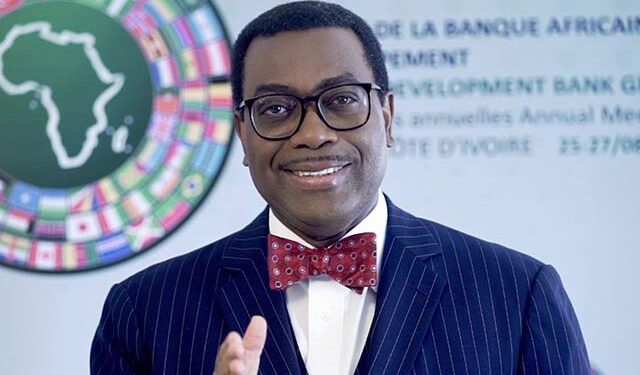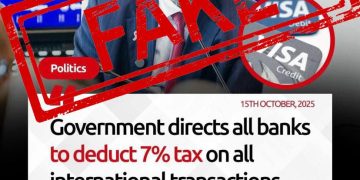AfDB President criticizes opaque loans tied to Africa’s natural resources
The head of the African Development Bank is calling for an end to loans given in exchange for the continent’s rich supplies of oil or critical minerals used in smartphones and electric car batteries, deals that have helped China gain control over mineral mining in places like Congo(link is external) and have left some African countries in financial crisis.
“They are just bad, first and foremost, because you can’t price the assets properly,” Akinwumi Adesina said in an interview with The Associated Press in Lagos, Nigeria, last week. “If you have minerals or oil under the ground, how do you come up with a price for a long-term contract? It’s a challenge.”
Linking future revenue from natural resource exports(link is external) to loan paydowns is often touted as a way for recipients to get financing for infrastructure projects and for lenders to reduce the risk of not getting their money back.
The shift to renewable energy and electric vehicles(link is external) has caused a spike in the demand for critical minerals, driving these kind of loans. That includes a China-Congo deal that strengthens Beijing’s position in the global supply chain for EVs and other products as it taps into the world’s largest reserves of cobalt, a mineral used to make lithium-ion batteries(link is external), in the impoverished central African country.
Adesina, whose Abidjan, Ivory Coast-based institution helps finance development in African countries, said these arrangements come with a litany of problems.
He highlighted the uneven nature of the negotiations, with lenders typically holding the upper hand and dictating terms to cash-strapped African nations. This power imbalance, coupled with a lack of transparency and the potential for corruption, creates fertile ground for exploitation(link is external), Adesina said.
“These are the reasons I say Africa should put an end to natural resource-backed loans,” Adesina said. He pointed to a bank initiative that helps “countries renegotiate those loans that are asymmetric, not transparent and wrongly priced.”
Adesina said loans secured with natural resources pose a challenge for development banks(link is external) like his and the International Monetary Fund, which promote sustainable debt management. Countries may struggle to get or repay loans from these institutions because they have to use the income from their natural resources — typically crucial to their economies — to pay off resource-tied debts, he said.
Adesina specifically mentioned Chad’s crippling financial crisis after an oil-backed loan from commodity trader Glencore(link is external) left the central African nation using most of its oil proceeds to pay off its debt.
A Glencore spokesperson did not immediately respond to a request for comment.
After Chad, Angola and the Republic of Congo approached the IMF for support, the multilateral lender insisted on the renegotiation of their natural resource-backed loans.
At least 11 African countries have taken dozens of loans worth billions of dollars secured with their natural resources since the 2000s, and China is by far the top source of funding through policy banks and state-linked companies.
Western commodity traders and banks, such as Glencore, Trafigura and Standard Chartered, also have funded oil-for-cash deals(link is external), notably with the Republic of Congo, Chad and Angola.
Standard Chartered didn’t immediately respond to an email seeking comment, while Trafigura pointed to its 2020 report called “Prepayments Demystified,” which says that “trading firms are enabling production that would otherwise not be possible — thus underpinning economic growth, job creation and the generation of fiscal revenues in the countries concerned.”
Adesina said there was no “fixation” on one country as being behind these types of loans when asked about criticisms over China’s lending backed by oil; critical minerals such as cobalt and copper used in electric vehicles and other products; and bauxite, the main mineral in aluminum manufacturing, which has been used in China’s recent resource-backed loan contracts with Guinea and Ghana.
“It is not about one country or the other; any country can exploit when you don’t know what you are doing,” he said, adding, “The capacity to negotiate at the country level, the capacity to plan, the capacity for debt management is very important.”
Mao Ning, spokesperson for China’s Ministry of Foreign Affairs, told reporters last year that Beijing operates with the “principle of transparency and openness” in relations with Africa.
Congo has been looking to review the infrastructure-for-minerals agreement it signed with China in 2008 over concerns it gets too few benefits from the arrangement. That grants Chinese firms Sinohydro and China Railway Group a 68% stake in a joint venture for copper and cobalt with Congo’s state mining company, Gecamines.
Last year, Congo’s state auditor demanded China’s infrastructure investment commitment be increased to $20 billion from the original $3 billion to match the value of the resources sold by the state under the deal. China rejected the auditor’s report.
Adesina, a former Nigerian minister for agriculture, said the African Development Bank’s new Alliance for Green Infrastructure in Africa aims to mobilize $10 billion to help countries finance “bankable” sustainable infrastructure, including in the energy and transport sectors, which could limit the allure of problematic financing.








